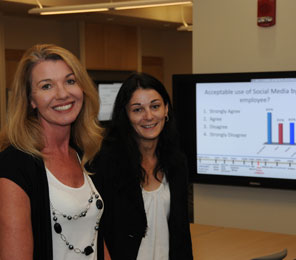 |
|
| Faculty training for ResponseWare virtual polling technology is being conducted by Laurie Theriault (left) and Lucy Green, pictured here in front of a sample polling slide projected in the iTLC. | |
True or false: audience response systems enhance teaching and learning? The answer is true, and with the rollout of a new audience response system now underway at UMass Medical School, faculty and students alike will reap the benefits.
Also known as polling, audience response allows instructors to incorporate interactive questions into new or existing presentations. Every student can then instantly answer the questions via an input device, usually a handheld clicker. The system automatically posts the responses, showing how many respondents answered correctly—and incorrectly—on the projection screen. This immediate feedback mechanism can help instructors assess student comprehension and adjust their teaching accordingly, as well as promote active learning by engaging students in discussion and debate.
This year the School of Medicine is expanding its current polling capabilities with TurningPoint ResponseWare, a web-based virtual polling program that eliminates reliance on clickers and the other hardware needed to use them. Instead, respondents can answer the polling questions via computer or smart phone. Implementing the web-based system is yet another way to take advantage of the School of Medicine’s recently introduced laptop program, which provides every medical student with a laptop configured specifically to accommodate the SOM curriculum.
“Clickers still have a place here, but now we can do so much more,” said Laurie Theriault, instructional technologist for Academic Computing Services, who is leading the ResponseWare rollout and training. “For example, because students can type responses on a keyboard, instructors can now pose fill-in-the-blank, short answer and essay questions in addition to multiple choice, true/false or yes/no questions.” Beginning this August, all first- and second-year SOM students will receive a software license for ResponseWare in addition to their clickers.
ResponseWare follows on the heels of UMass Medical School’s initial foray into polling technology five years ago with a TurningPoint clicker system, so that the new system will meld seamlessly with it. The hardware and software for clicker polling is installed in all the amphitheaters at UMMS, as well as in the state-of-the-art Integrated Teaching and Learning Center; faculty can borrow equipment to use them in other locations. Each SOM student is issued a clicker when they begin medical school.
“TurningPoint systems work with Powerpoint, a big plus because faculty can easily add interactive questions into existing slides,” said Lyn Riza, MS, associate chief information officer for Academic Computing Systems and instructor in family medicine & community health. Involved in bringing polling technology to UMMS from the start, Riza noted that faculty didn’t ask for polling per se. “We recommended it as a way to meet their need to find out what students do and don’t know.” Feedback indicates virtual polling is especially useful for second-year medical students who must prepare for their board exams by scanning, sifting and synthesizing two years’ worth of basic science and clinical knowledge.
Anthony Poteete, PhD, professor of microbiology & physiological systems, welcomes the advent of ResponseWare, which will make it even easier for faculty to incorporate polling into their courses. Already an early and enthusiastic adopter of audience response systems at UMMS, Dr. Poteete encourages fellow faculty to join the virtual polling bandwagon. “A huge advantage of virtual polling is that I can get all of my students to answer a question, instead of just one who may be the only person in the room who understands the concept,” he said. “It helps me know what students know, instead of guessing.”
Not just for teaching, audience response can also assist in many administrative and managerial tasks such as program evaluation. For example, new user Heather-Lyn Haley, PhD, assistant professor of family medicine & community health, plans to use it this fall for the department’s annual faculty development retreat. “The retreat brings together our faculty who practice at sites across the state, so it is always a great opportunity to collect information,” Dr. Haley explained. “With polling, I hope to get more replies with less effort than paper surveys.”
“TurningPoint has given us a powerful, quickly accessible individual technology that works well with campus wide learning system technology,” said Riza. “With the ResponseWare system, students will now have the opportunity to take advantage of their predilection for smart phones.” In fact, Riza anticipates that Academic Computing Services and the Office of Educational Affairs will be polling students on their preferences as to what devices they most like to use.
“We don’t want anyone to be intimidated by the technology, and are here to help,” Theriault emphasized. Enrollment for ResponseWare classes is open, and individual assistance is also available from her and educational technology coordinator Lucy Green.
To learn more about polling at UMMS, visit http://inside.umassmed.edu/content.aspx?id=37098. To sign up for training, visit http://i.umassmed.edu/events/istraining_events.aspx?pid=22.